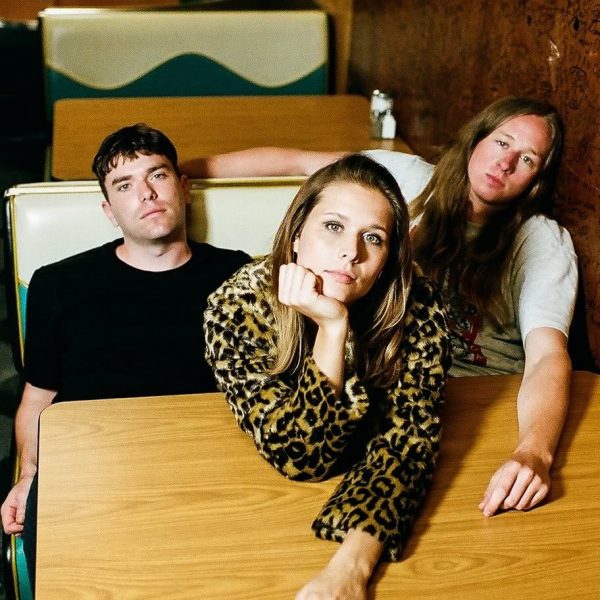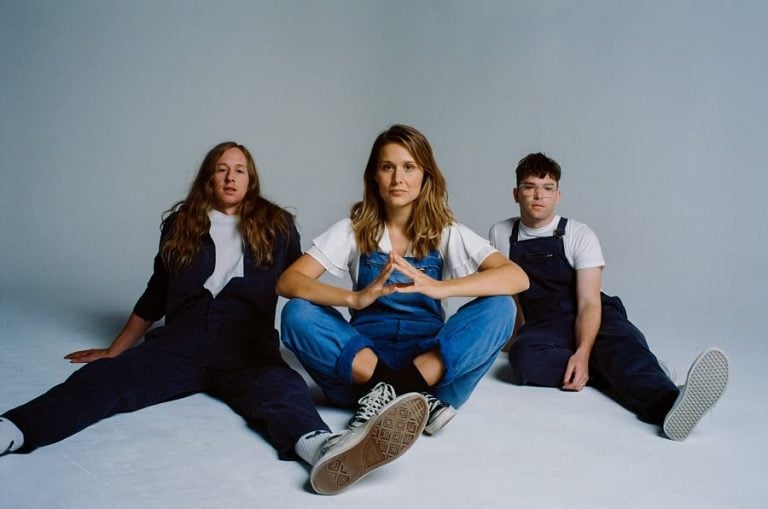There’s not many of us that will live to fulfil our wildest creative dreams. True commercial artistic success is rarer than any biopic or musician’s autobiography could ever make it seem: right now there are thousands of struggling geniuses out there more talented than you or I will ever be who have as little chance of striking gold as we do.
And even those who do manage to hit it big don’t necessarily see their future as being written. Middle Kids, a Sydney-based three piece made up of Hannah Joy, guitarist Tim Fitz, and drummer Harry Day, might have burst onto the scene two short years ago in a flurry of chart-ranking singles, opening spots for Ryan Adams and the Cold War Kids, and success and acclaim overseas, but they don’t necessarily see their career as being stable. “Who knows what will happen?” Joy says, her eyes gleaming.
Indeed, the band have largely given up on reading their own tea leaves these days. In person, they give off an easy, untroubled air; Joy and Fitz are husband and wife, Day their good friend. They have none of the weariness that bands can develop even reasonably early into their career: their brows are unfurrowed; their laughs rich and abrupt.
Watch the music video for the Middle Kids song ‘Mistake’ here:
Their new record, Lost Friends, shares that sense of ease, and light, and laughter. Debut records can sometimes be tortured, convoluted affairs, but Lost Friends is as uncomplicated as honey on toast; as rich as a glass of red wine. It is the sound of three people having the time of their lives; three people who care about nothing but making the music they want to make.
They’ve already decided how they’re going to celebrate the album’s release. “We’ll have a dinner,” Joy says. “We’ll have a great feast. I want big carafes of wine that swill.” But past that point, the record will firmly become its own living, breathing, changeable thing. They have no demands of it; no expectations. For them, the hardest part is already in the past. The world will take Lost Friends whatever way the world wants to, and Middle Kids will keep doing what they have always done, producing beautiful, life-affirming songs as though doing so were as easy as drawing breath.
This interview has been edited and condensed for clarity.
Love Music?
Get your daily dose of metal, rock, indie, pop, and everything else in between.
The BRAG: Was there a moment when you decided that you wanted to make music full-time?
Hannah Joy: I mean, making music is all I could ever do. This is all I wanted to do. I was never like, ‘I’m going to be a musician!’ There was just never anything else competing for my attention or imagination. It’s just been the thing that I’ve continued to do. That said, you don’t actually ever believe you can do it for your job. But maybe now we’re going, ‘Hey, perhaps we could?’
You don’t usually get to do something you really love for your job.
Harry Day: I always wanted to do it. I don’t think I even knew why, when I was younger – I still don’t. It’s just the thing I’ve felt most strongly about, and most passionately about. And now I think I’m starting to see why that is.

Tim Fitz: You don’t usually get to do something you really love for your job, so we’re really fortunate. But also, it’s something that’s not so financially stable. You’ve got to decide you’re going to do it. There’s a certain risk you have to accept. Which is cool.
Would you still be making music then even if it wasn’t a job?
TF: That’s what we’ve been doing in our whole lives. You do it ’till someone says, ‘Maybe we’ll allow you to make some money doing this.’ And you go, ‘Great, I was going to be doing this anyway.’
HJ: It does mean that regardless of where this project goes, we just know we’ll always have music as this really special thing outside of just being a career. It’s probably the most sacred, special thing. It’s such a gift to us; it makes us come alive. And we’re always going to have that. That is amazing.
Watch the music video for the Middle Kids song ‘On My Knees’ here:
HD: It’s weird when you become an adult and it goes from being that thing that you love – the thing you don’t need to be anything – to sort of navigating a career in it. You’re trying to keep that pure thing that you had when you were younger, while also making important career decisions.
Is that intimidating?
HD: It is. Life’s pretty scary, whatever you do. And anything that’s a risk is going to be scary. But we’re doing it together. We’re all scared together.
Was there a specific moment you knew making music could be a career then?
TF: There was never a specific moment; there was a series of them. You start to see that you’re doing things that if you looked at other bands doing them, you’d go, ‘Oh, they’re really going for it.’ The band’s doing things that we never imagined we would be able to do. At some point you have to accept that there’s a real amazing opportunity here, and that you have to follow it wherever it goes.
HD: I think it’s hard when you’re in it to get a sense of the relative size of it. But there are definitely moments when you see it kinda clearly and you’re very thankful for it. I find those moments very energising as well. It can be a little thing. It could be a message you get from a fan about how the music is impacting their life. That’s something that is very personal. Or it could be when you play a show; a big show. That’s cool as well.
Watch Middle Kids play KEXP here:
HJ: That’s been very cool; touring places that we’ve never been to before and playing shows. They’re often small shows, but that people are there, and they know us and our music; that makes you go, ‘Wow, okay.’ You’re caught up in the day-to-day of it, just making the things. And then you go, ‘Oh, something is happening’. Something external to us is moving.
Is there the sense then that when you release a song you have to kind of release ownership of it? You have to relinquish it?
TF: One hundred per cent. It stands on its own; it’s separate from the artist. That’s something that I think people can get confused about. You’ve created something; it’s not yours anymore. It just has to speak for itself.
Is that scary though – the idea that people could take it however they want?
TF: They should. That’s what we do when we listen to something.
HD: There’s a relief when you release it. When it’s still yours, you second guess it. But when it’s out, you go; ‘That’s it.’
HJ: That’s the power of art. There is a risk from the outset – there is a bit of fear involved. But the job of art is for other people to own it and interpret it. I feel like that with all my favourite songs; like, they’re my favourite songs. They have impacted me and they mean something very different to other people. That’s why art is so powerful. It connects so many different people in so many different walks of life. It does mean we don’t have control. But we shouldn’t.
Lost Friends, the new record from Middle Kids is out this Friday May 4. For more longform interviews, read our chat with Angie McMahon here.

































